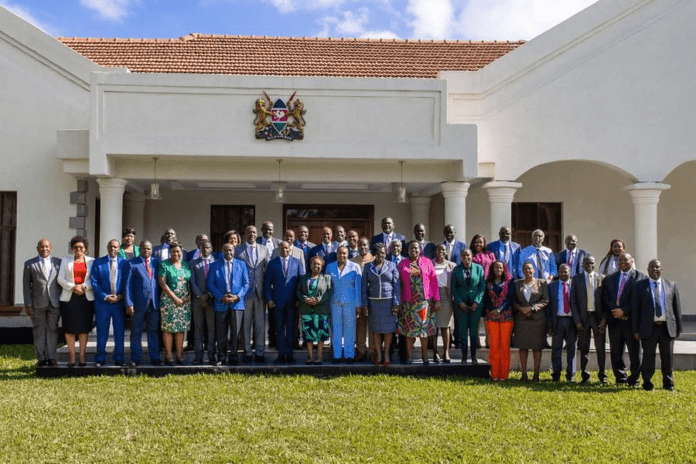
Deputy President Kithure Kindiki has assured coffee farmers of increased earnings this year, citing key government interventions that have improved production and boosted returns.
Speaking on Thursday, Kindiki stated that the projected price for coffee cherries in 2024 is KSh110 per kilogram, nearly double what farmers earned before the Kenya Kwanza administration took office in 2022.
He attributed the rise in earnings to a series of reforms aimed at streamlining the coffee subsector and tackling long-standing challenges that have hindered profitability for farmers.
“We have to ensure coffee farmers earn more and that coffee once again becomes a key foreign exchange earner. Our manifesto commits us to improving incomes and value for farmers and other players in the value chain,” he said.
The Deputy President reaffirmed the government’s commitment to implementing the Guaranteed Minimum Returns of KSh100 per kilogram of coffee cherries.
Kindiki made these remarks while hosting members of the National Assembly Coffee Caucus at his Karen residence to discuss ongoing reforms and explore further strategies to improve the sector.
The Deputy President also called for the swift enactment of the Coffee Bill, 2023, and the Cooperatives Bill, 2024, which are currently before the Senate after being approved by the National Assembly.
“These Bills are crucial to the success of coffee sector reforms, and we urge the Senate to expedite their processing,” he noted.
In addition, the government is working with county governments and relevant agencies to ensure that farmers access quality seedlings and appropriate fertilizers conveniently and on time.
“Last-mile distribution of subsidized fertilizer has already demonstrated success in other sectors such as sugarcane and maize. We must ensure coffee farmers also benefit,” Kindiki added.
The government is also focusing on waiving accumulated debts for cooperatives, modernizing processing factories, reducing losses along the production chain, and expanding Kenyan coffee’s presence in new global markets.
As part of efforts to increase output, the government is encouraging coffee cultivation in non-traditional growing areas such as Rift Valley, Western, Nyanza, and Lower Eastern regions, which have shown significant potential.
The plan also includes enhancing productivity per bush by providing quality seedlings, improved farm inputs, pesticides, and extension services.
“We can achieve higher yields by increasing both the acreage under coffee and the production per bush. Our target is to raise yields from two kilograms per bush to ten kilograms by 2027, as promised in our manifesto,” he added.
The National Assembly Coffee Caucus, which comprises seventy-eight MPs representing coffee-growing constituencies, pledged to support legislation aimed at making coffee farming more profitable.
Caucus Chairperson and Nyeri Town MP Duncan Mathenge stressed the importance of sustaining reforms to ensure the gains made are not reversed.
“We have the expertise to implement any necessary reforms. Conflict of interest must also be addressed—millers cannot be brokers and buyers at the same time,” he said.
Lugari MP Nabii Nabwera called for the provision of quality seedlings to help farmers in Western Kenya diversify into coffee farming, while Gichugu MP Gichimu Githinji emphasized the need to modernize coffee factories to enhance production and maintain quality.
“Some factories still use equipment from the 1960s. Urgent modernization is necessary to boost efficiency and earnings,” Githinji said.
Tinderet MP Julius Melly urged for more awareness campaigns on the coffee cherry fund to ensure farmers benefit from it instead of relying on expensive bank loans.
Tigania West MP John Mutunga, who chairs the Agriculture Committee, emphasized the role of research in advancing the sector, adding that the pending Bills provide for the revitalization of research institutes to support coffee production.






